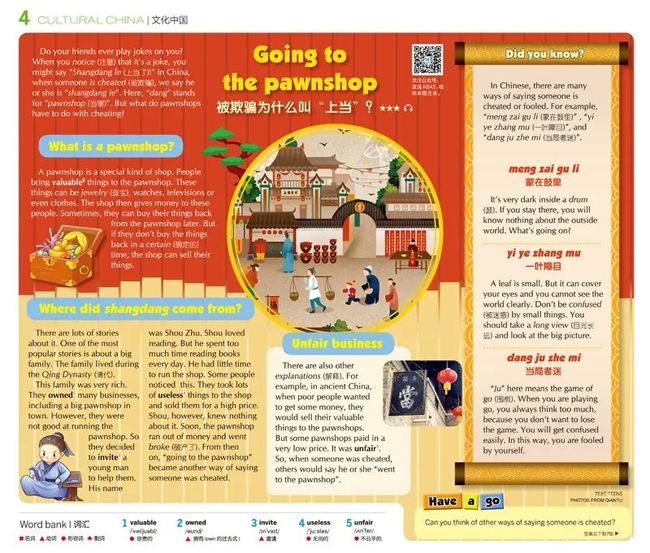被欺骗为什么叫“上当”? | TEENS好文精选
“TEENS好文精选”定期推送《21世纪学生英文报》(TEENS)中的精选文章,部分文章配有音频或视频、知识点解析、测试题、课件或课程等学习和教学资源,内容丰富、形式多样~
今天的精选文章“Going to the pawnshop被欺骗为什么叫“上当”?”来自《21世纪学生英文报·小学》第642期第4-5版。

Going to the pawnshop
被欺骗为什么叫“上当”?
Do your friends ever play jokes on you? When you notice (注意) that it’s a joke, you might say “Shangdang le (上当了)!” In China, when someone is cheated (被欺骗), we say he or she is “shangdang le”. Here, “dang” stands for “pawnshop (当铺)”. But what do pawnshops have to do with cheating?
What is a pawnshop?
A pawnshop is a special kind of shop. People bring valuable things to the pawnshop. These things can be jewelry (珠宝), watches, televisions or even clothes. The shop then gives money to these people. Sometimes, they can buy their things back from the pawnshop later. But if they don’t buy the things back in a certain (确定的) time, the shop can sell their things.
Where did shangdang come from?
There are lots of stories about it. One of the most popular stories is about a big family. The family lived during the Qing Dynasty (清代).
This family was very rich. They owned many businesses, including a big pawnshop in town. However, they were not good at running the pawnshop. So they decided to invite a young man to help them. His name was Shou Zhu. Shou loved reading. But he spent too much time reading books every day. He had little time to run the shop. Some people noticed this. They took lots of useless things to the shop and sold them for a high price. Shou, however, knew nothing about it. Soon, the pawnshop ran out of money and went broke (破产了). From then on, “going to the pawnshop” became another way of saying someone was cheated.
Unfair business
There are also other explanations (解释). For example, in ancient China, when poor people wanted to get some money, they would sell their valuable things to the pawnshops. But some pawnshops paid in a very low price. It was unfair. So, when someone was cheated, others would say he or she “went to the pawnshop”.
Did you know?
In Chinese, there are many ways of saying someone is cheated or fooled. For example, “meng zai gu li (蒙在鼓里)” , “yi ye zhang mu (一叶障目)”, and “dang ju zhe mi (当局者迷)”.
meng zai gu li
蒙在鼓里
It’s very dark inside a drum (鼓). If you stay there, you will know nothing about the outside world. What’s going on?
yi ye zhang mu
一叶障目
A leaf is small. But it can cover your eyes and you cannot see the world clearly. Don’t be confused (被迷惑) by small things. You should take a long view (目光长远) and look at the big picture.
dang ju zhe mi
当局者迷
“Ju” here means the game of go (围棋). When you are playing go, you always think too much, because you don’t want to lose the game. You will get confused easily. In this way, you are fooled by yourself.









